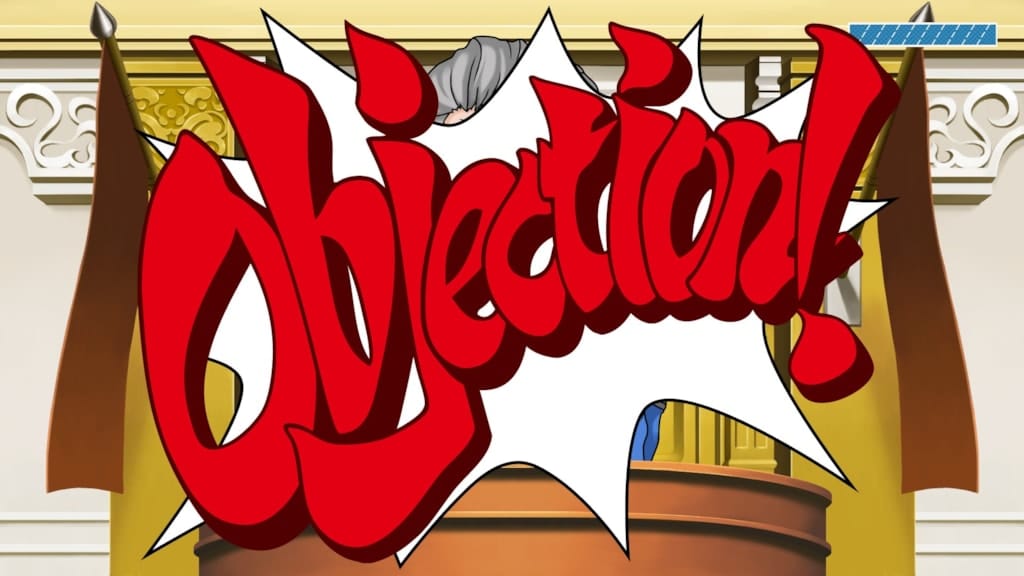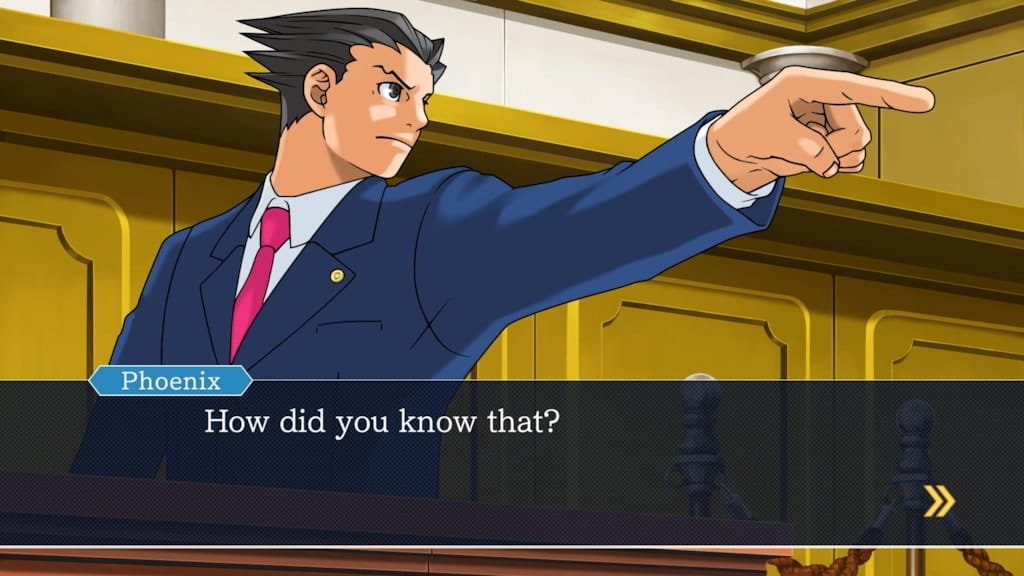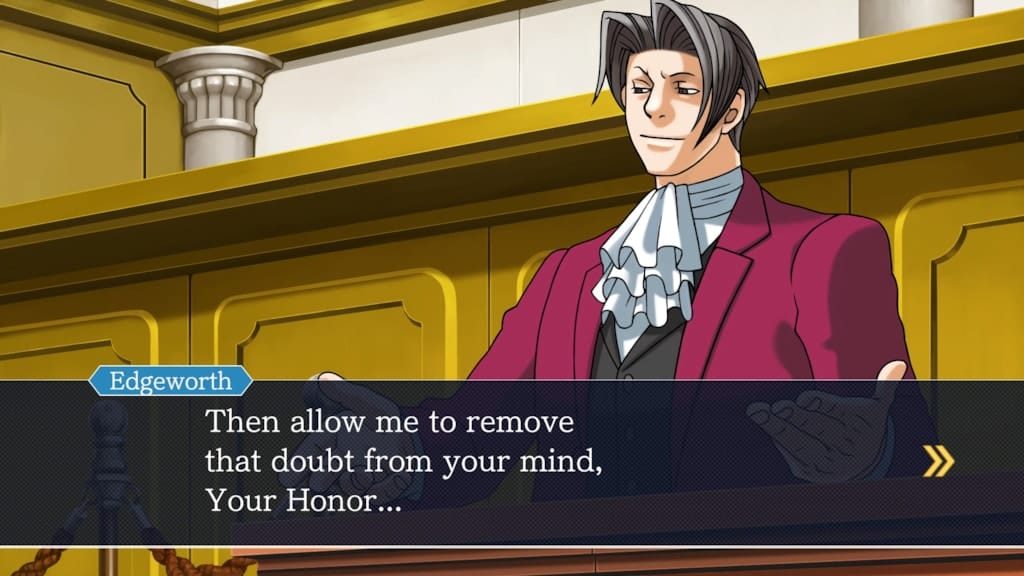WordPlayer: Phoenix Wright: Ace Attorney And The "Dream Job"
A game about finding your true calling

Recently, I made two unrelated, yet interconnected, decisions. The first was to leave my narrative design lead job at a game studio - a job title that just barely exists here in Australia - to pursue new opportunities. The second was to replay Phoenix Wright: Ace Attorney, a game I'd last rolled credits on back in 2006 on the Nintendo DS. Back then, the game needed to be imported, and my copy came in one of those chunky European boxes that needed to accommodate an extra-thick instruction manual in multiple languages. I'd read about the game in Hyper magazine and immediately knew that it was my kind of game - even though, really, I'd never played anything like it.
For the uninitiated, Phoenix Wright: Ace Attorney is a visual novel with investigative puzzle elements and several extended court battle sequences, in which Phoenix, a newly-minted attorney, seeks justice for a variety of clients falsely accused of murder. In the first game's cases - and indeed, most cases in subsequent games - each case has a similar structure. The person accused of the murder looks super guilty - there were witnesses, they had the gun in their hand, they have motive and no alibi and a mountain of what looks like definitive evidence. Phoenix, along with his stalwart assistant/resident spirit medium Maya Faye, proceeds to investigate the crime himself before typically proving not only his client's innocence, but also the true culprit's guilt.
In 2021, I cited Phoenix Wright: Ace Attorney as one of the five games that had inspired my shift into narrative design. At the time, being a narrative designer still felt like a dream opportunity, an incredible opportunity that might carry me through the rest of my working life. Playing Ace Attorney again as I shift out of that position has been a curious, bittersweet experience, not just because I'd thought of this game as being so tied to that job. It's also because the first Ace Attorney game is telling the story of a young man who has just started the serious project of his life's work, and it's going really well. Phoenix Wright has found his true calling, and he's going to stick with it.

At the time, being a narrative designer still felt like a dream opportunity, an incredible opportunity that might carry me through the rest of my working life.
This part of the series, the whole "performing the job of a lawyer" patina, has always felt rich and interesting and unique to me. But the first time I played the game, I was 19, and now, somehow, I'm 36. Phoenix Wright is 24 in the first game, and about my age in the most recent release, Spirit of Justice. In the intervening years since I first played the game, I have worked in retail, built a career as a critic and journalist, tried my hand at being an academic-of-sorts and teacher, shifted briefly into news reporter, pivoted into game development, and tried all sorts of other things in-between. I have attached myself to games, just as Phoenix attached himself to law, but I've never had the same strong sense of knowing exactly where I fit that he clearly does.
Playing the game again with a longer resume and a great deal more experience of the working world has given me a deeper appreciation for this game's approach to Phoenix's career, and how nice it is to experience his growth in the first game. A lot of games, ultimately, are about a person doing their job. But the jobs in games are rarely as mundane as "criminal attorney" - and as much as Ace Attorney spices the job up, the mundanity is actually part of the appeal. Because who wouldn't like to find their true calling, and have it be something tangible, something achievable? Courtroom battles may not look the same in real life, but someone can still, if they so choose, find that law is their calling and go through the steps necessary to practice it. The game captures that youthful excitement you feel when you start to realize that at least some of your dreams might be within reach if you apply yourself.
In the strange world of these games, the law operates differently. Trials cannot run more than three days, and defendants are essentially assumed guilty until proven innocent - a guilty verdict might be called if their lawyer simply isn't doing a very good job of defending them, even if the evidence isn't there. But from the very first case, Phoenix Wright is, canonically, an excellent attorney. He is able to consistently defend his clients against prosecutors who are not just good, but undefeated, including his friend-to-foe-to-friend-again Miles Edgeworth. Ace Attorney reflects the law through a funhouse mirror, and not at all representative of how real criminal trials proceed, but there's some truth at its core to the idea of a legal battle's ultimate goal is to reach a just verdict - and that the innocent will always be proven so.

Playing the game again with a longer resume and a great deal more experience of the working world has given me a deeper appreciation for this game's approach to Phoenix's career, and how nice it is to experience his growth in the first game.
Putting aside all the sequels for a moment, the story of the original Phoenix Wright: Ace Attorney is fairly straightforward and dramatic, like a soap opera. Throughout his first cases, Phoenix is drawn into strangely personal dramas - his first client is a childhood friend who has been falsely accused of murdering his girlfriend (grim!). His second client is his assistant Maya, accused of murdering her sister - who was also Phoenix's mentor. The fourth, and most dramatic, case, involves Edgeworth - your rival prosecutor has been accused of murder, and now needs you to not only defend him in the courtroom, but to untangle his own complicated past. Ace Attorney never gets too bogged down in the terrible tragedies that could easily overwhelm the storytelling - the focus is always on finding truth and achieving victory. Thanks to the deft touch of the incredible localisation team, the game never feels callous or salacious.
Part of the genius here is that Phoenix isn't just solving these cases - he's putting his own life, and the lives of those around him, in order. And for the player, Phoenix's life is the law. We never see him on the days when there's no case to investigate: we understand him as an extension of his job, and we come to see that interpersonal disputes, issues, and misunderstandings can also be solved through the courtroom. Perhaps between episodes he's reviewing cases, writing papers, revisiting past decisions - but we always meet him in the thick of things. The game is full of fun, weirdo characters, most of whom Phoenix must help, in one way or another, in pursuing the truth. In Ace Attorney, that's just a normal part of being a lawyer.
This is a continued theme throughout the entire series, but I'm surprised, going back, how well-realized it feels in the original game, how contained its dramas are, how much sense the whole thing makes despite being so silly. I've always loved the twistiness of these games, how effective and surprising the solutions to each case can be. I love Phoenix as a character because he's so dedicated to pulling at every thread, peeking through every crack, finding every truth. He's really good at this! He's doing exactly what he should be doing with his life.

Thanks to the deft touch of the incredible localisation team, the game never feels callous or salacious.
Having played the entire series, I know that Phoenix has his ups and downs, his career setbacks (the existence of Apollo Justice, a game that I also love, complicates everything.) But I also know that the series always puts Phoenix back in his blue suit, behind a desk, and that it always feels right.
Phoenix Wright Ace Attorney: Trials and Tribulations was the first game I ever reviewed professionally. It was an imported copy, and I probably scored it too low. Perhaps that's another reason why this series has always felt so tied to my own career, all the pathways I've taken, the roads I keep wandering back to. I've never had Phoenix's certainty that I'm doing exactly what I should be doing, and the stars have never aligned in such a way where I've felt like I was going to make the world a better place by dedicating myself to any specific calling. That's okay - I have long made peace with the fact that life is more complicated than a wacky game about being a lawyer (and the friends of mine who are real lawyers certainly seem like their own lives are full of challenges that are very different from the ones in the game). But still, there's a sweetness to playing a game that presents a completely broken legal system and then suggests that justice will always prevail, as long as this one specific guy who knows exactly what he should be doing with his life is on the case. We should all be so lucky.